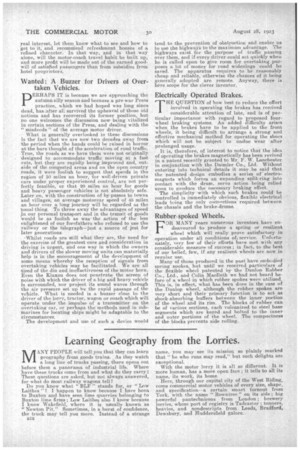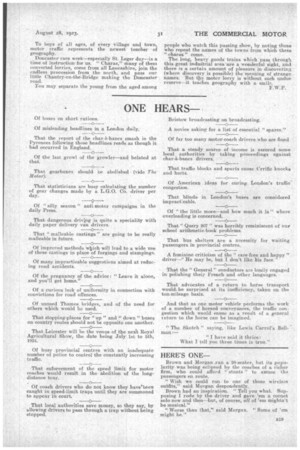Learning Geography from the Lorries.
Page 2

Page 3

If you've noticed an error in this article please click here to report it so we can fix it.
MANY PEOPLE will tell you that they can learn geography from goods trains, , As they watch a long line of trucks passing, there opens out before them a panorama of industrial life. Where have these trucks come from and what do they carry!? These questions are asked, but not always answered, for what do most railway wagons tell?
Do you know what " BLF " stands for, or "Low Laithes " ? I happen to know because I have been to Buxton and have seen lime quarries belonging to Buxton lime firms ; Low Laithes also I know because I know Wakefield, where it is usually known as "Newton Pit." Sometimes, in a burst of confidence, the truck may tell you more. Instead of a strange B18 name, you may see its mission so plainly marked that " he who runs may read," but such delights are exceptional.
With the motor lorry it is all so different. It is mote human, has a more open face ; it tells to all its name, its work, its home
Here, through our capital city of the West Riding, come commercial motor vehicles of every size, shape, and specification—a certain smart turnout from York, with the name " Rowntree " on its side ; big powerful pantechnicons from London ; brewery lorries, whose port of registry is Tadcaster tonners, heavies, and nondescripts from Leeds, Bradford, Dewsbury, a,nd Huddersfield galore. To boys of all ages, of every village and town, motor traffic represents the newest teacher of geography.
Doncaster race week—especially St. Leger day—is a time of instruction for us. " Charas," many of them converted lorries, come from all Lancashire, join the endless procession from the north, and pass our little Chantry-on-the-Bridge making the Doncaster road.
You may separate the young from the aged among people who watch this passing show, by noting those who repeat the names of the towns from which these " charas " come.
The long: heavy goods trains which pass through this great induStrial area are a wonderful sight, and there is a certain amount of pleasure in discovering (where discovery is possible) the meaning of strange names. But the motor lorry is without such undue reserve—it teaches geography with a smile.
F.W.P.




























